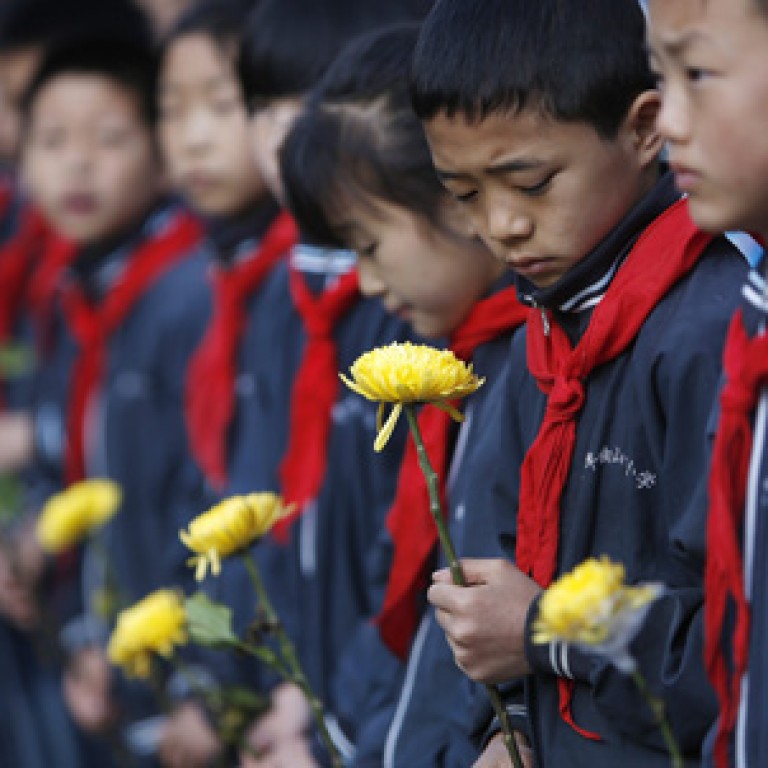
Hundreds mark fifth anniversary of Sichuan quake at mountain memorial
Hundreds mark anniversary of quake at mountain memorial to victims
Chen Huaqin placed a yellow chrysanthemum at the tomb of her only son Zhu Qiang, who died age 19 in the Sichuan earthquake, and started to burn money.
Her eyes were red with tears and her voice trembled.
"May you have a good life in the other world," said the 50-year-old from Luzhou.
She was among hundreds of mourners who gathered yesterday in Yingxiu, the epicentre of the 8.0-magnitude quake that struck on May 12, 2008.
They were marking the fifth anniversary of the disaster that killed more than 80,000 and left a deep scar in the country's collective consciousness.
A few dozen metres away at a memorial wall for victims in the public cemetery in Yingxiu, an 80-year-old Shibi - a wizard of the Qiang culture - chanted prayers to the soft beats of drums by a dozen men.
Chen lingered in front of the tomb all morning, locking her eyes on the young face on the tombstone. "I never saw him in uniform," she said.
"My biggest regret was not being able to say goodbye to him. I didn't even see the body."
Zhu was a member of the armed police in Yingxiu and was killed by a landslide triggered by the earthquake.
"He was such a filial boy, sending me money every month because my husband had died and I didn't have a job. He called me the day before because it was Mother's Day. It was the last time we spoke."
People who lost relatives in the quake and tourists have been visiting the public cemetery in the tiny mountain town since Friday to pay their respects.
The cemetery, built above a giant pit where more than 4,000 bodies were buried, became their place to mourn on special days like the quake anniversary, even though the bodies of many of their loved ones were not found.
More than 2,000 names of victims and the location where they died are inscribed on the black walls of the cemetery.
People laid flowers near the names of loved ones or touched the stone and murmured a few words. Some were inscribed without a birthday because whole families died and more than 2,000 bodies were not identified. "I hope he's not lonely here, with more company," Yu Xiaomei, 41, said as she burned money offerings for her husband.
He worked in a power plant engulfed in the quake and his body was never found.
Survivors of three victims of the same plant had all remarried, but Yu said she could not bear the thought of doing so, even though she admitted she was lonely now that her son was boarding at middle school.
"We were very happy for the 12 years we were together," she explained.
"We graduated from the same vocational school and got work in the same plant. He's the best husband I could think of."
At 2.28pm, the exact time the earthquake struck, more than 2,000 government employees, students and residents paid their respects in silence at the memorial monument on the site of the Xuankou Middle School, where 54 teachers and students were killed.
They walked in a line and each laid down a yellow or white chrysanthemum.
Among the tourists was 21-year-old Zhang Bin , who travelled from Yibin with his brother, his pregnant sister-in-law and his girlfriend to burn money offerings and read the names on the memorial wall.
"This is for the dead countrymen. I felt very sorry for them," Zhang said.
Jia Yan, from Chengdu, took her four-year-old daughter to the ceremony to lay chrysanthemums for the victims and to teach her "to love others and cherish what you have".
Asked what she felt about the earthquake, the young girl said: "You run and run until you are in the open clearing and nothing could fall down and hurt you."

